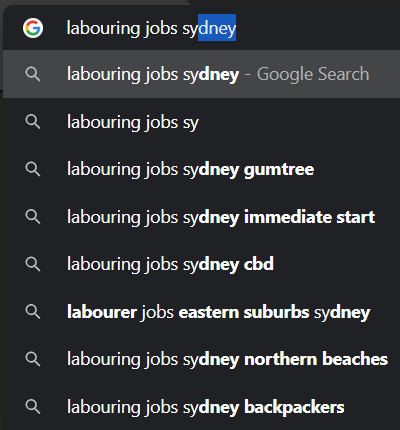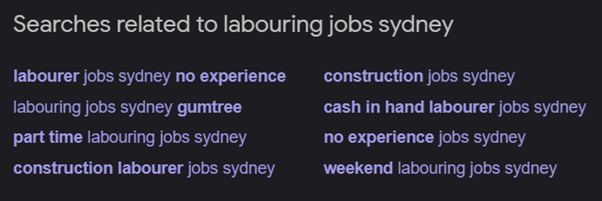blog

Posted On Wednesday, April 14, 2021
Author: Philip Sampson (Account Director)
As discussed in our article ‘What Are Keywords’, keyword research is generally better to outsource to a professional due to them having access to expensive tools and data that most people don’t. The tools being prohibitively expensive to individuals because the business model is generally to sell the software wholesale to the SEO agencies who in turn can justify the price by selling reports retail.
But don’t fret, there are some free techniques to get some reasonable ideas for keywords to target that can be done for free, though you won’t get search volume or competition data which is far from ideal. Let’s have a look at one of them now...
You know when you search and Google tries to guess what you might type? Sometimes it’s helpful, sometimes it’s funny. Many a website & YouTube channel has derived comedy from it. Well, it turns out that it is really useful for SEO keyword research. Check this out...


Sticking with the construction industry example from the last article, I started typing in ‘labouring jobs Sydney’ into the address bar in Google Chrome and it starts showing me suggestions for what I might be typing in. Now, why do you think it has made these suggestions? Simple, they are the most searched terms that start with what I have already typed. You can actually do variations of these entries, for example you could leave out your location if you are sitting in the same city as your candidates and jobs because Google knows where you are already, they all do. This will bring up more suggestions. You could also replace ‘jobs’ with ‘work’ and restructure the original search term e.g. ‘Sydney labouring jobs’.
Looking at this list of suggestions, if this was my agency, I might decide to use phrases such as ‘immediate start’ and ‘backpackers welcome’ wherever possible and applicable. Remember, if you are appealing to these search terms and your competitors aren’t, then that gives you a massive advantage. This could be in the job description, title, categories or types. You could also create dedicated pages on your site and/or a section on your homepage where you list jobs with ‘immediate start’, making sure to optimize the for focus keyword. Remember, job titles, categories and locations are used as headings and page titles on your website's listing and job pages so will be considered important by the Googlebot’s when understanding what the page is about.
On the note of location, I would also make sure that the ATS & website were set up so that jobs on the job board can be tagged and sorted using locations including ‘Easern Suburbs’, ‘CBD’ and ‘Northern Beaches’ whenever possible as these are highly searched places. The more of those you have listed, the greater you will be perceived by Google.
If we actually hit enter on the original search then we can scroll down to the bottom and find this li’l gem…


Again, this suggests we should start looking at where we can include ‘no experience’ on our website and in the content, same for ‘weekend’, where applicable of course.
I would probably also consider writing a blog article titled ‘Why Cash in hand Labourer Jobs in Sydney are Terrible!’ or ‘The 5 Best Labouring Jobs in Sydney for Backpackers’ as part of a complete content marketing strategy, not just for SEO. You may start to see lots of opportunities to drive high quality traffic using content marketing ideas derived from some of these suggestions, more on that in another series.
You can also start to fall down a rabbit hole of repeating the process now with terms like the suggested ‘construction labourer jobs Sydney’ or just start to punch in other common job positions you fill. Maybe go generic with ‘construction jobs Sydney’ and see where that leads you!
Rather importantly, the suggestions will also give you a good understanding of how people are formatting their searches and you can adapt your website to the public's writing style with well optimised job categories, locations titles and even the descriptions as well. The closer your page titles and headings match exactly what people are typing in, the greater your chances of appearing near the top in search results for it. Also, due to psychology, the closer your terms match theirs, the higher the chance they will click. This applies to advertising too. Though, having search volume data does help a lot with this, which you don’t get from this method.
Well, first of all, create a spreadsheet before you start doing anything else. From here, you want to start typing into the search and at least write down key phrases you think are important to your business in their own row on the spreadsheet. You might also want to include the original search term used to find it, whether it was an autocomplete suggestion or related search term from the bottom of the page and where it ranked in the suggestion order. As you can see this can become quite complex. It might be better to just keep it in simple list format if you want to keep things easy. Don’t forget to look for the type of ideas I suggested above.
If you were thinking about getting a comprehensive keyword research report done for you by a professional then a simple, a list of key phrases you personally value is a very good starting point for them. As much as it is also the job of the professional to come up with new ideas for key phrases as well as provide search volume and competition data, the better the seed list you give them, the better they can do their job by finding more long-tail (long) key phrases, keeping relevant and most importantly, understand your business better.
If all of this seems a bit overwhelming or you just want to have someone experienced do it faster and easier because you have enough on your plate already, then give us a shout to discuss. We have a variety of tools that help with this and can also include search volume and competition data, a super helpful metric to ensure you are focusing on what people are typing. Needless to say, we also understand the recruitment industry better than any other digital agency out there, so there is that too 😉.